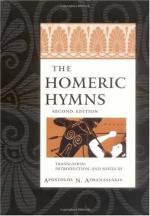Then sped both of them, the fair children of Zeus, to sandy Pylos, at the ford of Alpheius, and to the fields they came, and the stall of lofty roof, where the booty was tended in the season of darkness. There anon Hermes went to the side of the rocky cave, and began driving the sturdy cattle into the light. But the son of Leto, glancing aside, saw the flayed skins on the high rock, and quickly asked renowned Hermes:
“How wert thou of avail, oh crafty one, to flay two kine; new-born and childish as thou art? For time to come I dread thy might: no need for thee to be growing long, thou son of Maia!” {156}
[So spake he, and round his hands twisted strong bands of withes, but they at his feet were soon intertwined, each with other, and lightly were they woven over all the kine of the field, by the counsel of thievish Hermes, but Apollo marvelled at that he saw.]
Then the strong Argus-bane with twinkling glances looked down at the ground, wishful to hide his purpose. But that harsh son of renowned Leto, the Far-darter, did he lightly soothe to his will; taking his lyre in his left hand he tuned it with the plectrum: and wondrously it rang beneath his hand. Thereat Phoebus Apollo laughed and was glad, and the winsome note passed through to his very soul as he heard. Then Maia’s son took courage, and sweetly harping with his harp he stood at Apollo’s left side, playing his prelude, and thereon followed his winsome voice. He sang the renowns of the deathless Gods, and the dark Earth, how all things were at the first, and how each God gat his portion.
To Mnemosyne first of Gods he gave the meed of minstrelsy, to the Mother of the Muses, for the Muse came upon the Son of Maia.
Then all the rest of the Immortals, in order of rank and birth, did he honour, the splendid son of Zeus, telling duly all the tale, as he struck the lyre on his arm. But on Apollo’s heart in his breast came the stress of desire, who spake to him winged words:
“Thou crafty slayer of kine, thou comrade of the feast; thy song is worth the price of fifty oxen! Henceforth, methinks, shall we be peacefully made at one. But, come now, tell me this, thou wily Son of Maia, have these marvels been with thee even since thy birth, or is it that some immortal, or some mortal man, has given thee the glorious gift and shown thee song divine? For marvellous is this new song in mine ears, such as, methinks, none hath known, either of men, or of Immortals who have mansions in Olympus, save thyself, thou reiver, thou Son of Zeus and Maia! What art is this, what charm against the stress of cares? What a path of song! for verily here is choice of all three things, joy, and love, and sweet sleep. For truly though I be conversant with the Olympian Muses, to whom dances are a charge, and the bright minstrel hymn, and rich song, and the lovesome sound of flutes, yet never yet hath aught else been so dear to my heart, dear as the skill in the festivals of the Gods. I marvel, Son of Zeus, at this, the music of thy minstrelsy. But now since, despite thy youth, thou hast such glorious skill, to thee and to thy Mother I speak this word of sooth: verily, by this shaft of cornel wood, I shall lead thee renowned and fortunate among the Immortals, and give thee glorious gifts, nor in the end deceive thee.”




